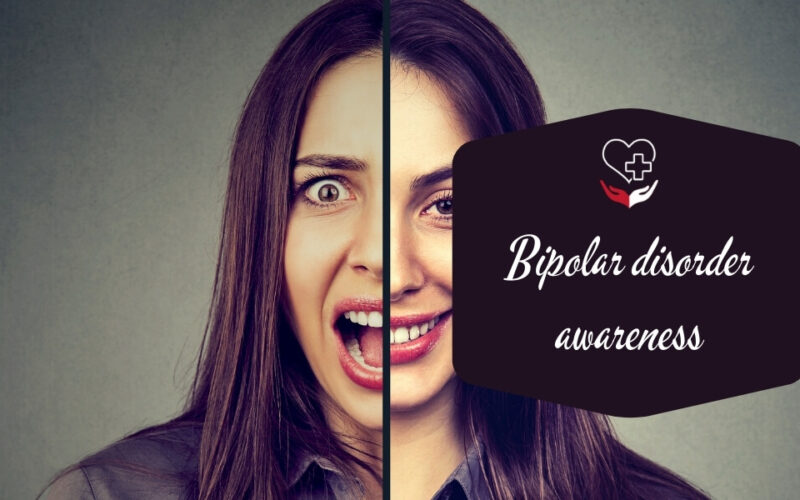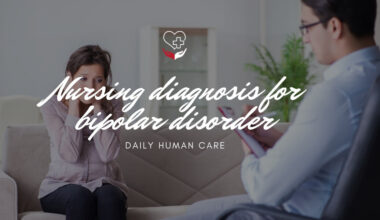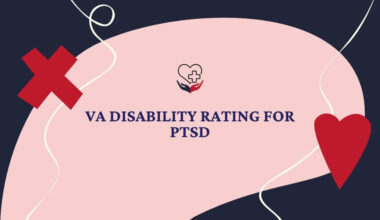In this article, Daily Human Care will discuss that bipolar disorder awareness is essential, and World Bipolar Day is celebrated on 30th March every year.
Table of Contents
Bipolar disorder:
Bipolar disorder (formerly known as a manic-depressive or manic-depressive illness) is a psychological illness that triggers an erratic mood, energy, activity levels, concentration, and everyday functioning.
Three forms of bipolar disorder exist. All three types of moods, energy, and movement are subject to precise changes. These moods vary from cycles with a high degree of ‘ups’ to very ‘downs’ to sad or hopeless ones, or with increased agitation or energy (known as depressive episodes). Less extreme phases of mania are known as episodes of hypomania.
Symptoms
Bipolar disorder awareness is essential if you have symptoms because these symptoms vary between individuals, according to the International Bipolar Association. An episode can last several months or years for some people. Others might experience ‘ups and downs’ simultaneously or rapidly. The person has four or more episodes in a year in the case of “rapid cycling.”
Symptoms can consist of:
- No sleep, but not tiredness
- A feeling of boredom or diversion
- Job or school lacking
- Job or low school results
- To be socially active and upcoming, hostile at times
- Decreased libido
- An excited or euphoric feeling
- High expectations of autonomy, self-esteem, and self-importance.
- Speak much and quickly
- Jumping from one subject to another
- Denying or not understanding that something is wrong
- A sense of desperation and sadness
- Extreme sorrow
- Sleeplessness and sleeping disorders
- Mild anxiety problems
- Discomfort or health problems not reacting to the therapy
- A feeling of remorse that can go wrong
- Loss of weight or rise in weight
- Profound exhaustion, extreme fatigue, and hesitation.
- Unwilling, usually for pleasures, to enjoy events or interests
- Concentrating and recalling troubles
- Moodiness
- Sound smelled and other sensitivities that other people do not consider
- Unable to confront school or work, which could lead to poor academic performance
Also, see the famous 13 celebrities with personality disorders.
Bipolar Disorder Awareness:

2.8% of U.s. adults suffer from bipolar disorder. It is the sixth-largest cause of disability by the World Health Organization and impacts around 45 million individuals globally (WHO).
Celebrated each year in collaboration with the Asian Bipolar Organization (ANBD) as well as the Global Bipolar Network, the Worldwide Bipolar Day (WBD) is a worldwide awareness initiative for the ISBD (IBPF).
WBD offers a forum By international cooperation for:
- Global preparation.
- Open debate
- Enhanced bipolar disorder responsiveness
World Bipolar Day is a day to connect, raise bipolar disorder awareness, and fund the bipolar disease together. Unfortunately, we know many people invest isolation on this 30 March due to the continuing COVID-19 obstacles. Being alone and split from daily routines can make anyone difficult. Still, it gives people with mental disabilities unique challenges where social support networks play an essential role in preserving well-being. We advise you to mark this year a technological remembrance of WBD because of these hurdles.
WBD offers a forum By international cooperation for:
- Global preparation.
- Open debate
- Enhanced bipolar disorder responsiveness
There are, however, a few things essential to remember on World Bipolar Day to support you fight against stigmatization:
Bipolar disorder influences all areas of life: the complete bipolar disorder that can develop over anyone can be hard to understand since it is a neglected disease.
Bipolar disorder seems to have several factors, from biology to life circumstances: bipolar disorder is no alteration, life event, or chemical brain imbalanced. It is a mixture of several genetic and chemical causes, many of which can contribute to bipolar disorder.
Bipolar disturbance rarely occurs alone. Bipolar disorder can also come with other psychosocial problems if it is not an issue that includes depression and manic episodes. Physiologic conditions and migraines are part of these.
All have various bipolar disorders: bipolar disorder awareness is essential because each individual has a different type of condition that looks like signatures and drops. There are no almost unmistakable signs for two individuals, and any diagnosis can be very different.
Many famous people are dealing with bipolar: famous people like Demi Lovato, use the popular stage to fight the misconception of bipolar disorder.
There can be a link with originality: did you guys know that Vincent van Gogh’s birth World Bipolar Day takes place? Van Gogh has been classified retroactively as developing bipolar disorder, considering among the most successful composers of all time
This risks survival and help are vital: bipolar disorder awareness is essential because about 1 out of 5 individuals suffering from bipolar disorder struggle with madness. World Bipolar Day is a chance toward demonstrating to individuals who face everyday struggles that they’re not lonely; they have their help, so there’s always optimism.
The Truths & Misconceptions
Bipolar disorder is full of false stereotypes. Some of these theories are discussed here.
- Myth: Just one form of this disorder is present.
Truth: It’s two there. The evaluation of bipolar I disorder indicates that the individual has a manic episode. Evaluation of Bipolar II means that an individual undergoes or at least experiences hypomania one depressive condition (Mindy mania; agitation and hyperactivity). Symptoms of hypomania and mania are shared, including reduced sleep, and greatness (with inflated belief in the value of yourself or your ability). The functional disability in job, school or family relationships, other welfare connections, etc., is nevertheless a required mania feature. Hypomania is generally defined as less severe,” while chronic hypomania may have a detrimental impact on the mental and emotional state of an individual.
- Myth: Bipolars often turn around manic and depressive moods.
Truth: Most people have no swift mood (or episodes) in various ways. Sometimes even a person with this disorder has a combined state that has manic and depressed characteristics. The most vulnerable times for individuals with bipolar disorders are often mixed states that should be seen as sincerely as a depressed and manic state. Skilled attention is generally needed promptly. People sometimes misunderstand what is really a combined state and what they wrongly term fast spinning. Instead of creeping among mood situations, however, quick cycling means that there have been at least four significant moods in the preceding 12 months.
Also read an interesting article about the co-occurrence of mood and anxiety disorders by Daily Human Care.





